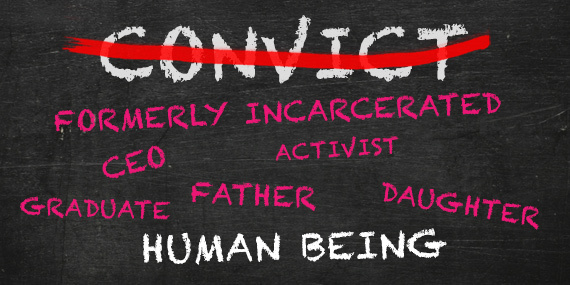May 4th was a day I'd been anticipating for some time. That was the day Assistant Attorney General Karol Mason, who heads the Office of Justice Programs in the Department of Justice, publicly announced a new agency-wide policy directing her staff to stop using "disparaging labels" like "ex-convict" and "ex-felon" in all their communications. In a guest post that appeared in The Washington Post Mason urged other agencies and organizations to join her in replacing those old labels with terms like, "person who committed a crime and individual who was incarcerated, decoupling past actions from the person being described and anticipating the contributions we expect them to make when they return." I knew the announcement was coming because I and other leaders of the formerly incarcerated people's movement had met with AAG Mason on a number of occasions and had told her that changing the language was one of our highest priorities.
For those of us who have experienced firsthand the horrors of mass incarceration, changing the language is a crucial step in our long march towards dignity, respect, and reintegration. The old adage about "sticks and stones" is wrong. Words can and do hurt. They are powerful reminders of stigma and exclusion. The father of our movement, Eddie Ellis (1941-2014), who spent 23 years in prison and went on to play a leading role in our struggle for human rights, understood this very well. A decade ago he wrote an "Open Letter to Our Friends on the Question of Language" in which he asked progressive publications and organizations to stop using offensive labels like "ex-con," "ex-offender" and "ex-felon" and start substituting the words "people" and "returning citizens." He wrote:
"We believe we have the right to be called by a name we choose, rather than one someone else decides to use. We think that by insisting on being called people, we reaffirm our right to be recognized as human beings, not animals, inmates, prisoners or offenders. We also firmly believe that if we cannot persuade you to refer to us, and think of us, as people, then all our other efforts at reform and change are seriously compromised."
Every modern movement for civil rights has gone through the process of challenging pejorative labels and epithets used by mainstream society to dehumanize, deprecate, or demean them. The women's movement rejected "girl," "chick," and the "Mrs.-Miss" distinction. The LGBT movement rejected terms like "fag," "dyke" and "homo." In our long and still ongoing struggle for equality, African Americans have cast aside "coon," "darkie" and "nigger."
It's also true that marginalized communities sometimes appropriate those epithets as a way of removing their sting. Think "Riot Grrls" and "Dixie Chicks" or "Queer as Folk." But this happens only after the movement has succeeded in changing the language in mainstream discourse, and those epithets are acceptable only when used by members of the community, not outsiders. Even using them in front of outsiders can be controversial as the storm that followed black comedian Larry Wilmore's referring to President Obama as "my nigga" during the 2016 White House Correspondents' Dinner showed.
We are not there yet. We are still at the beginning of our renaming process. We are still in the early stages of reclaiming our own humanity. And although there are hopeful signs of change, the headlines are reminders of how far we still have to go. Ironically, The Washington Post's headline for Assistant Attorney General Karol Mason's Guest Post announcing her new policy was, "Justice Dept. agency to alter its terminology for released convicts, to ease reentry." In fact, headlines about positive reforms to bring about the reintegration of the formerly incarcerated into society are often undercut by these offensive labels. The Washington Examiner reports, "'Ban the box' move provides ex-convicts a chance to work." "Former felon helps other ex-convicts register to vote" according to a newspaper in Fredericksburg, PA. The ABC News website announces, "DOJ Pushes New Effort to Help Ex-Convicts and Stop 'Enormous Waste of Human Potential.'' The media is still way behind the curve.
I am an "ex-convict." I am also a husband, father, son and brother. I'm a college graduate and a former Vice President of the Fortune Society. I'm the founder and president of a social justice organization, JustLeadershipUSA. And I'm only one of millions of Americans who have come through the other side of the mass incarceration gristmill and gone on to do good things. Those are the things we want to be recognized for.
Three days after the Office of Justice Programs' announcement, The New York Times editorial board wrote,
"The vocabulary of incarceration--the permanently stigmatizing way we speak about people who have served time--presents a significant barrier to reintegration. Federal officials have set out the change that lexicon, so that people who have committed crimes have a better chance of being seen not as faceless abstractions, but as human beings worthy of being back in society."
They got it right. And we will keep advocating for new language until they are the rule and not the exception.
